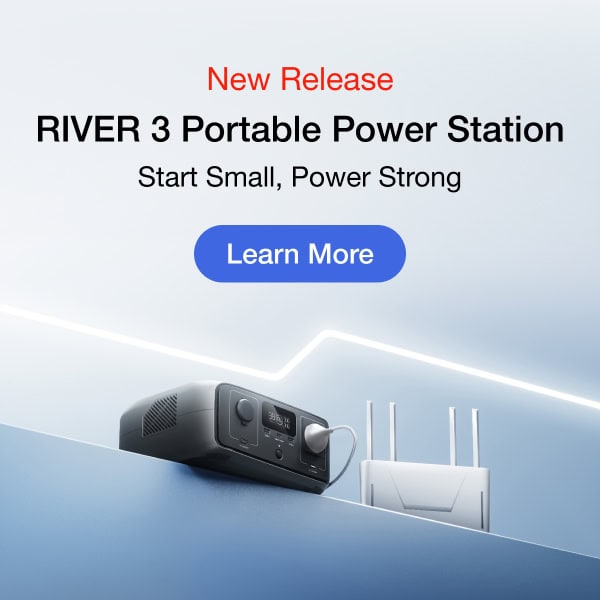Table of Contents
If you’ve ever wondered if solar panels need direct sunlight or if they can work in the shade, you’ve come to the right place.
While the answer may seem like a simple yes or no, the truth is more nuanced. It’s important to understand that a solar panel’s power rating is based on clearly defined ‘optimal conditions,’ but the real world seldom operates this way.
Let’s take a look at the difference between direct and diffused light and how this affects your energy output.
Is Direct Sunlight Required for Solar Panels?
When you use solar panels like EcoFlow’s Rigid Solar Panels or EcoFlow’s Portable Solar Panels, they utilise global solar radiation to generate energy, including both direct and indirect radiation. Both sunlight forms carry photons, and your solar panels can use either form to generate electricity.
Direct solar radiation is when the sun is directly shining on the surface of your panel without being scattered. In other words, there is an uninterrupted line of sight from the sun to your modules, which is when they work best.
Indirect or diffuse radiation is when the sun’s energy is absorbed, scattered, and reflected by air molecules, water vapour, clouds, dust, and pollutants. It still carries photons, and your panels will generate electricity, but it won’t be as efficient. In fact, the only time your solar panels won’t work is when there is no solar radiation, which is why they don’t work at night.
Using an additional energy source such as an EcoFlow Delta Pro power station will keep your power on at night, even when you aren’t generating electricity, so you can still use the sun’s energy to generate all your electricity needs.
So the short answer is no, your solar panels don’t need direct sunlight, but they’ll give you a much higher energy output in these conditions.
Standard Test Conditions for Solar Panels
| Condition Type | Standard Test Condition | Real-World Conditions |
| Solar Incident Angle | Always zero, irradiation beam always normal to the PV panel* | Variable and depends on time, date, and site latitude. In the case of rooftop systems, roof orientation and inclination govern system capacity. |
| Solar Irradiation | Always equal to 1000 Watts/m²* | Variable and depends on the time, date, and site latitude. Limited sunshine hours bound system capacity. |
| Ambient Temperature | Always 25°C* | Variable and depends on the time, date, weather condition, and site latitude. Higher ambient temperature degrades PV panel efficiency and reduces system output. |
| Air Mass Coefficient (AM) | Always equal to 1.5* | Variable and depends on the time, date, and site latitude. Higher AM with higher latitudes. |
| System Losses (e.g., Wiring, Inverter) | Always Zero* | Variable and depends on the design and location of PV panels, inverter, and grid meter. |
*Cannot be achieved in real-world operation (Source: ResearchGate)
What is Rated Power Based On?
Rated power is based on a solar panel’s performance under strict laboratory test conditions.
It’s crucial to understand that when you have a PV module with a rated power of 400W, you will never achieve your maximum rated power if you install it in a location with only diffuse radiation.
Power ratings are based on optimal operating conditions of 77°F (25°C) ambient temperature, with peak sunlight directly overhead.
In the real world, we rarely have optimal conditions. Weather, clouds, dust, and shade will reduce your power output. The angle of the sun overhead, which varies seasonally, will also create less than optimal conditions.
Do Solar Panels Work in the Shade?
Your solar energy system will receive diffuse sunlight in the shade and continue working, but it won’t be nearly as efficient. How much you lose varies on your location and the amount of shade, but losses from 50% to 80% are not uncommon. As your solar panels operate in series, if one is in the shade, it will affect the performance of your whole system, much like a string of lights won’t work when you remove a single bulb.
For those concerned about having enough light, bifacial panels such as EcoFlow’s 220W Bifacial Portable Solar Panels maximise their output by capturing the sun’s rays on both sides. They allow you to catch indirect light from the back of the module while capturing direct light from the front.
The Effect of Weather Conditions on Sunlight Availability
The weather can also significantly impact your solar array’s efficiency by creating those less-than-optimal conditions. Light becomes diffused when clouds roll in, and energy production could be reduced by 75% or more depending on their thickness. When the sky is overcast and raining, light is scattered further, and your efficiency can drop even more. However, that same rain will also clean your photovoltaics, reducing the build-up of dust and dirt and affecting efficiency.
If there’s snow covering your set-up, this can prevent the light from reaching their surface altogether. If your area receives a lot of snowfall, you may want to purchase a snow rake or install snow guards to help keep your modules clear and ready to receive sunlight when it’s available.
How Much Sunlight Do Solar Panels Actually Need?
The amount of sunlight your array needs depends on your local conditions, energy needs, and the size, type, and quantity of modules you have. The higher your home’s energy needs, the more panels you require, leading to a need for greater levels of sunlight.
Using quality solar panels and installing them in an optimal location, ideally with a minimum of four hours of peak sunlight, will ensure your panels perform optimally.
If you live in an area that receives relatively little sunlight, you can still use solar energy, but you may need more modules and must optimise their location to receive as much sunlight as possible.
Frequently Asked Questions
Your photovoltaics will work in daylight or sunlight. However, they produce the most power when the sun is directly overhead, operating optimally at peak sunlight. Daylight, also called diffused light, which is scattered before reaching your PVs, will still generate solar power, just at a lower efficiency.
Final Thoughts
Technically speaking, your solar panels don’t need direct sunlight since they can also utilise diffuse light. However, you will need at least some direct sunlight to maximise the energy produced by your set-up, and many factors affect their efficiency, like weather conditions and capacity.
Be sure you choose the right system for your location, such as EcoFlow’s Solar Panels, install enough modules to account for sub-optimal conditions, and position them in the most optimum location possible. Then, you’ll get the most out of your renewable solar energy system and begin enjoying the benefits of renewable energy.





